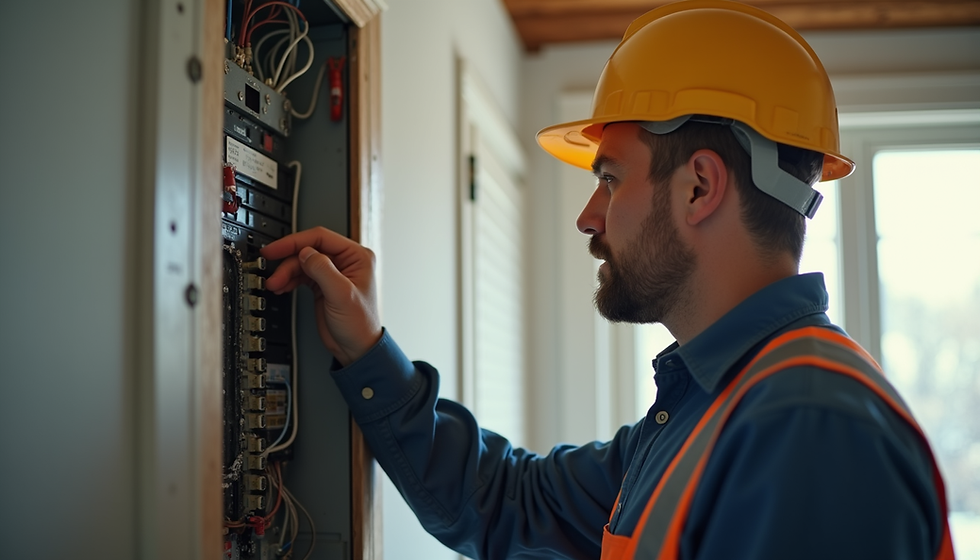Top Concerns Home Buyers Should Know About During Home Inspections
- David Lee
- Nov 21, 2025
- 3 min read
Buying a home is one of the biggest investments most people make. A home inspection plays a crucial role in this process, revealing hidden issues that could affect the property's value and safety. Knowing what to watch for during a home inspection helps buyers make informed decisions and avoid costly surprises. This post highlights the top concerns every home buyer should understand when their potential new home undergoes inspection.

Structural Integrity
The foundation and structure of a house are the backbone of its safety and longevity. Inspectors look for cracks in the foundation, uneven floors, and signs of water damage in basements or crawl spaces. These issues can indicate settling problems or structural weaknesses that may require expensive repairs.
For example, a small crack in a concrete foundation might be harmless, but large or widening cracks could signal serious problems. Uneven floors or doors that don’t close properly often point to shifting foundations. Buyers should ask inspectors about the severity of these findings and potential repair costs.
Roof Condition
The roof protects the entire home from weather damage. Inspectors check for missing or damaged shingles, leaks, and the overall age of the roof. A roof nearing the end of its lifespan can lead to water damage inside the home, mold growth, and increased energy costs.
If the roof is more than 15-20 years old, buyers should consider budgeting for a replacement soon. Signs like curling shingles or water stains on ceilings inside the house are red flags. A well-maintained roof means fewer worries down the road.
Plumbing System
Plumbing issues can cause major headaches and costly repairs. Inspectors test water pressure, check for leaks, and examine pipes for corrosion or damage. They also look at water heaters and drainage systems.
For instance, old galvanized pipes may corrode and clog, reducing water flow and causing leaks. Slow drains or water pooling around the foundation can indicate drainage problems. Buyers should ask about the condition of visible pipes and the age of the water heater to anticipate future expenses.
Electrical System
A safe and up-to-code electrical system is essential. Inspectors check wiring, outlets, circuit breakers, and grounding. Outdated or faulty wiring can pose fire hazards and may not support modern electrical demands.
Homes built before the 1980s often have knob-and-tube or aluminum wiring, which may need replacement. Inspectors also test GFCI outlets in kitchens and bathrooms to ensure safety. Buyers should be cautious if the electrical system looks outdated or if there are signs of DIY repairs.
Heating and Cooling Systems
Heating and cooling systems affect comfort and energy bills. Inspectors evaluate furnaces, air conditioners, ductwork, and thermostats. They check for proper operation, maintenance history, and efficiency.
A furnace older than 15 years might need replacement soon. Dirty filters, rust, or unusual noises during operation are warning signs. Buyers should ask about the age and condition of HVAC units and consider the cost of repairs or upgrades.
Water Damage and Mold
Water damage can hide behind walls and under floors, leading to mold growth and structural decay. Inspectors look for stains, musty odors, and signs of leaks around windows, roofs, and plumbing fixtures.
Mold can cause health problems and requires professional removal. Even small leaks can cause long-term damage if left unchecked. Buyers should pay close attention to any water-related issues and request further testing if mold is suspected.
Pest Infestations
Termites, rodents, and other pests can cause significant damage to a home’s structure and wiring. Inspectors check for signs of infestation such as droppings, nests, or damaged wood.
Termite damage is especially costly to repair and may not be covered by insurance. If pests are found, buyers should negotiate treatment and repairs with the seller before closing.
Insulation and Ventilation
Proper insulation and ventilation keep a home energy-efficient and prevent moisture buildup. Inspectors assess attic insulation, ventilation fans, and window seals.
Poor insulation leads to higher heating and cooling costs. Inadequate ventilation can cause condensation and mold. Buyers should consider upgrades if insulation is lacking or ventilation is poor.
Safety Features
Safety features like smoke detectors, carbon monoxide alarms, and secure railings are essential for protecting occupants. Inspectors verify that these are present and functioning.
Missing or non-working safety devices are easy fixes but critical to address before moving in. Buyers should ensure these features meet local safety codes.
Summary
A home inspection uncovers many potential issues that affect a property’s value, safety, and livability. Buyers should focus on the condition of the structure, roof, plumbing, electrical, HVAC, water damage, pests, insulation, and safety features. Understanding these concerns helps buyers negotiate repairs, plan budgets, and avoid unexpected costs.





Comments